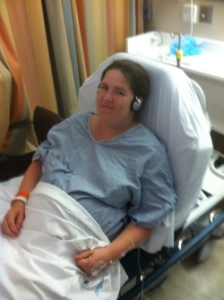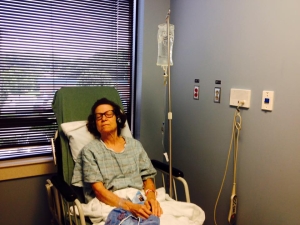Why Headphones in Surgery?
Have you had headphones in surgery before? This is increasingly happening in operating rooms around the world. If so, you know that today, most surgeons play their preferred music in the OR. Most of the time, they choose the music that they prefer. I’m totally in support of the surgeon having his preferred music, but rarely is this the music that the patient needs to hear.
When preparing for surgery, the patient needs slow, soothing, steady, simple textured, purely instrumental music. That is likely NOT what the surgeon will be choosing. The surgeon wants music that will help keep his energy and focus at a high level, sometimes rock and roll, sometimes upbeat jazz, sometime classical. Ir order for the best surgical outcomes, the patient needs to have headphones!
When the patient listens to their ideal music through lightweight, cordless headphones, such as the ones John has on in this photo, he can have the slow, steady, soothing music that will calm jangled nerves, stabilize breathing, blood pressure and body temperature, and decrease the need for as much anxiety medication and pain medication. It may even decrease the amount of anesthesia required, because when the patient is relaxed prior to surgery, it takes less anesthesia to put them under. And then the surgeon can have his own preferred music coming through speakers in the OR for him and for the staff to entrain with.
In addition to all the benefits for the patient and the surgeon, the hospital also benefits because in our research studies, patients who utilized the Surgical Serenity headphones had higher patient satisfaction ratings, across the board!
Another benefit is that HIPAA compliance is improved when patients are wearing the headphones in the pre-surgical area where medical staff is often discussing details of upcoming procedures with patients who are waiting in close proximity with only a curtain separating them.
To purchase the pre-programmed Surgical Serenity Headphones, click HERE.



